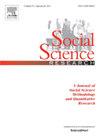Effects of local labor market conditions at birth on later life health and health behaviors
IF 3.5
2区 社会学
Q1 SOCIOLOGY
引用次数: 0
Abstract
Context
Social and economic conditions during childhood are linked with various outcomes in adulthood. Research shows that economic and health disparities arise early in life and get larger over time. However, little is known about the link between early life economic conditions and health during prime working ages.
Methods
We examine the long-term effects of local labor market conditions from birth to age 5 on health and risky health behaviors at prime working ages. We measure health outcomes using binary indicators of very good or excellent general health, the presence of physical limitations, and obesity. We measure risky behaviors through smoking status and alcohol consumption, including excessive drinking. We construct two versions of the Bartik instrument using data from the County Business Pattern and the Census to measure economic conditions during early childhood and link the Bartik indices to data from the Panel Study of Income Dynamics. We then use multivariate ordinary least squares regression to estimate the association between labor market conditions in childhood and outcomes in adulthood.
Findings
We find that better economic conditions in early childhood improve health in adulthood and reduce risky health behaviors. We also find important differences by parental education as well as by individuals’ race and gender. Additionally, we examine several potential pathways through which economic conditions might affect health and find evidence of increased paternal income and labor supply as well as higher individual educational attainment and earnings.
Conclusions
Our findings highlight the importance of early childhood economic environments for long-term health and development. They point to the value of policies that support families with children during periods of economic hardship. This includes programs like Unemployment Insurance, which directly address labor market disruptions, as well as income support policies such as the Earned Income Tax Credit and the Child Tax Credit, which can buffer the effects of reduced household resources. By mitigating the long-term consequences of adverse early-life conditions, such policies may improve not only health outcomes but also broader adult wellbeing.
出生时当地劳动力市场条件对以后生活健康和健康行为的影响
童年时期的社会和经济条件与成年后的各种结果有关。研究表明,经济和健康方面的差距在生命早期就出现了,随着时间的推移会越来越大。然而,人们对早期生活经济状况与黄金工作年龄期间的健康之间的联系知之甚少。方法研究出生至5岁期间当地劳动力市场状况对黄金工作年龄健康和危险健康行为的长期影响。我们使用总体健康状况非常好或非常好、存在身体限制和肥胖的二元指标来衡量健康结果。我们通过吸烟状况和饮酒(包括过度饮酒)来衡量危险行为。我们使用来自县商业模式和人口普查的数据构建了两个版本的Bartik工具来衡量幼儿时期的经济状况,并将Bartik指数与收入动态小组研究的数据联系起来。然后,我们使用多元普通最小二乘回归来估计儿童时期劳动力市场状况与成年期结果之间的关联。研究发现:儿童早期较好的经济条件可以改善成年后的健康状况,减少危险的健康行为。我们还发现,父母的教育程度以及个人的种族和性别也存在重要差异。此外,我们研究了经济条件可能影响健康的几种潜在途径,并发现了父亲收入和劳动力供应增加以及个人教育程度和收入提高的证据。结论研究结果强调了儿童早期经济环境对长期健康和发展的重要性。他们指出,在经济困难时期支持有孩子的家庭的政策是有价值的。这包括直接解决劳动力市场混乱的失业保险等项目,以及收入支持政策,如劳动所得税抵免和儿童税收抵免,这些政策可以缓冲家庭资源减少的影响。通过减轻不利的早期生活条件的长期后果,这些政策不仅可以改善健康结果,还可以改善更广泛的成人福祉。
本文章由计算机程序翻译,如有差异,请以英文原文为准。
求助全文
约1分钟内获得全文
求助全文
来源期刊

Social Science Research
SOCIOLOGY-
CiteScore
4.30
自引率
4.00%
发文量
0
审稿时长
65 days
期刊介绍:
Social Science Research publishes papers devoted to quantitative social science research and methodology. The journal features articles that illustrate the use of quantitative methods in the empirical solution of substantive problems, and emphasizes those concerned with issues or methods that cut across traditional disciplinary lines. Special attention is given to methods that have been used by only one particular social science discipline, but that may have application to a broader range of areas.
 求助内容:
求助内容: 应助结果提醒方式:
应助结果提醒方式:


